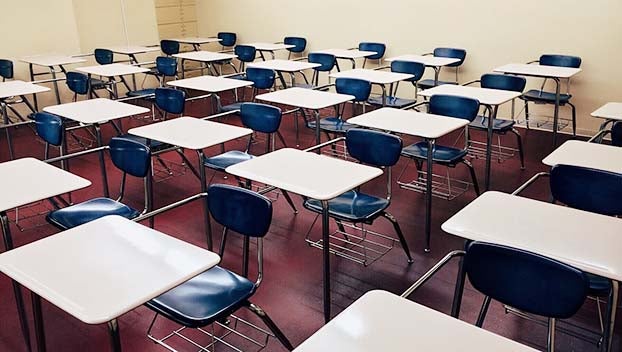Parents describe school year as ‘nightmare’ for students of Mississippi schools that never returned to in-person learning.
Published 10:21 am Wednesday, June 9, 2021
by Kate Royals
MISSISSIPPI TODAY
Last school year, Krystal Williams’ son Ca’Marion was named a “star student” in first grade at McNeal Elementary School in Canton Public School District.
In September of 2020, he was honored as a “high flying” second-grader, which recognizes students who are active in class, complete their assignments and are top performers.
But the longer his school stayed exclusively virtual, the more his grades suffered. By this spring, the end of a full academic year of distance learning, he had failed the second grade despite attempts by his mom to get him help along the way. The principal recently informed Williams her son is reading on a preschool level.
Canton Superintendent Gary Hannah declined to answer Mississippi Today’s questions about the district’s decision to remain virtual, but said in a statement the decision to was made “after careful consideration of the well-being of our students, staff, and community.”
There are countless stories like these in the six Mississippi public school districts that never returned to in-person learning during the 2020-2021 school year. The districts include Canton Public School District, Sunflower County Consolidated School District (with the exception of kindergarten through fifth graders at the end of the year), Holmes County Consolidated School District, East Tallahatchie School District, and West Tallahatchie School District.
All of the districts, with the exception of the C-rated Sunflower County, were rated “D” or “F’ in 2019, the most recent year for which data is available. Their students are overwhelmingly Black — a group of people who were disproportionately affected by the spread and fatality of the COVID-19 pandemic.
Parents in these districts, especially those with younger children and those with disabilities, described the year to Mississippi Today as “rough,” “horrible” and a “nightmare.” The mother of a 5-year-old autistic boy in Greenville said both she and her child would become so frustrated she would sometimes just take the pencil from him and do the work herself.
A mother of six in Sunflower County Consolidated School District said her kids got As and Bs before the pandemic, but their grades dropped drastically this year. Now, they’re doing virtual summer school, but she said attendance is a big issue. Sometimes teachers don’t even show up.
“I got one, his teacher hasn’t been in class all week. And the school don’t know (what’s going on),” said Lakita Richard. “It’s been chaotic.”
Education experts say that even a short period of virtual learning during the pandemic could have profound negative effects on generations of students – especially if access is an issue or they were already struggling. In the coming weeks and months, the experts predict data will bear that out.
Denise Soares, director of graduate studies at the University of Mississippi’s School of Education, said while there’s not much quantitative research available yet about the effects of extended virtual learning, qualitative studies point to virtual learning’s major challenges.
“We see across the board technological issues being the most significant, and a lack of student engagement and social interaction,” Soares said. “Also, these additional responsibilities are falling on the parent” to supervise and even teach their children.
And virtual learning may have a disproportionately negative impact on students with disabilities. Soares said special education students rely on individualized instruction, as evidenced by the individualized plans they receive in school often referred to as an IEP.
“Individualization is really hard when you have a virtual program that’s trying to serve everybody,” she said.
Cedrikia Johnson’s daughter Deniyah, a second grader at Goodloe Elementary in the Canton district, struggled with virtual learning. Her dyslexia made it hard for her to keep up at the same pace as the other students, and her mom, who was battling health problems, couldn’t be by her side at the computer.
“There were days she would sit in class crying for hours,” said Johnson, who would overhear her from the next room. She was limited with what she could do to help after suffering a stroke early this year and suffering subsequent heart problems.
Johnson had a family member come sit with Deniyah to try and help her with her schoolwork, but in April, they all contracted COVID-19. Johnson also developed pneumonia and was in and out of the hospital, and Deniyah missed school for almost a month — pushing her even further behind her classmates.
Despite the fact she struggled and missed almost all of May, she won’t have the option to attend summer school, her mother said. The principal told her the spots were already filled.
Fallout in Canton
Krystal Williams and other parents in Canton are being told their children have been selected to attend summer school, or what is referred to as “extended school year,” during the month of June. But they must also repeat their current grade next year.
Terricas Travis’ fifth grader at Goodloe Elementary has always been an average student, but after this year, he is failing, she said. He, along with Ca’Marion, was receiving extra help through a virtual after-school program funded by federal dollars called the 21st Century Community Learning Centers Grant Program.
But in November, Travis and Williams said the program abruptly stopped without explanation. “Due to unforeseen circumstances. We are not able to service second graders at 21st Century After-School! We apologize for the inconvenience,” a Nov. 9., 2020, message from one of Ca’Marion’s teachers read.
The 21st Century grant program funds activities that provide academic and other support for students in low-income and low-performing districts. There was no disruption in the program’s funding during the 2020-2021 school year, according to the Mississippi Department of Education, and it’s unclear why the program apparently stopped being offered to Williams and Travis’ children.
The district told the state education department it ran the after-school program at every elementary school through March of 2021.
Williams never stopped working as a certified nursing assistant at a nursing home during the pandemic, so she was never able to stay home with Ca’Marion and her three other children. Her children and her mother, who stayed home with her kids during the day, depend on her income, she said.
Williams said she reached out to teachers, the principal and called the district office about getting extra help for her son, who had been on honor roll in kindergarten and was regularly recognized for his academic performance. She ramped up her efforts in the spring, but got no response.
She kept messages and emails showing she asked for tutoring help, but one of his teachers told her she couldn’t tutor him because he was her student.
After speaking with the principal at the end of the year, however, Williams was told Ca’Marion was being tutored by that same teacher twice a day in areas of reading comprehension, further adding to Williams’ confusion.
“I reached out to the principal in February… I specifically said my biggest fear is that my 8-year-old will have to sit back in the second grade, and she said she would help me, she was going to come up with a strategy to help, and she never did,” said Williams.
Kendria Plummer, a parent of three children in Canton, has a similar story. She said the way all of her children’s grades dropped was “unbelievable.” She ended up paying for private tutoring for her 9-year-old both during the school year and now for the summer after he wasn’t offered a spot in the district’s summer school program.
“My children ain’t never had no F, no D … but since virtual learning they’ve had awful grades,” she said. She said she called the high school and elementary school throughout the year but would never hear back.
When the school year ended, Williams said she finally began receiving information about Ca’Marion — including an email from the principal telling her her son reads on a preschool level and would have to repeat the grade.
“Well, my question to her was: how did you allow my child to get to second grade” if he’s reading at a preschool level, said Williams.
Frustrated and upset, she took to Facebook Live to talk about her issues with the school district. She wanted to connect with other parents so they could get together and figure out what to do, she said.
“Something is wrong,” she said after receiving comments from other parents whose previously well-performing children were facing a similar situation. “They hurt our kids.”
Several parents also point to the fact that at the same time children were struggling behind computers at home, Canton and other districts, despite the fact they kept the school doors closed, allowed athletics to resume.
Canton High finished its boys’ basketball season with a 6-10 record and its abbreviated football season with a 2-4 record. And just north, Holmes County Consolidated Public School District, the high school boys’ basketball team played a total of 30 basketball games and even won its first ever state basketball championship — all while its students remained at home in their rural and under-connected district.
Officials with Canton Public School District, along with school board members, ignored questions from Mississippi Today about the parents’ grievances, the discontinuation of the after-school program for these students and its decision to allow athletics to resume while not resuming in-person learning. Recordings of past school board meetings offer no answers, either; they are mostly inaudible.
But benchmark testing data, or the tests given to students at the end of each nine weeks by the district to monitor progress, shows a decline in every end-of-the-year subject area test for high schoolers last school year compared to the previous year. There was also a decline in every subject except Biology compared to the 2018-2019 school year for the same assessment.
What’s next
Other school districts that operated virtually saw similar trends. The same data for Sunflower County Consolidated School District shows the district fell from an overall grade of “C” two years ago to an “F” this year.
The latest wave of federal COVID-19 relief funding sent a huge amount of money, referred to as Elementary and Secondary School Emergency Relief (ESSER), to all schools in Mississippi. Law requires 20% to be spent addressing learning loss created by the pandemic, and many are implementing summer school, or an “extended school year.”
Canton, for example, received around $13 million for its district of about 3,000 students, while $22.3 million went to Sunflower County and $19.7 million to Holmes County schools. Districts are funded based on Title I allocations, which are federal dollars given to schools with a high number of low-income students enrolled.
These districts, along with others in the state, will use this money to safely return to in-person instruction if they have not already done so and to address students’ knowledge gaps. Officials don’t know the extent of the gaps at this point statewide, as state assessment results won’t be available until later in the summer.
Immediate intervention for students who need it most is critical to mitigate learning loss, Soares said.
“Every instructional minute that students are in a classroom or online needs to be effective, no matter the delivery,” she said. “… We’ve got to have students engaged in learning and able to access learning.”
Next year, students must return to the buildings. The state education department has said it expects in-person learning to be “the primary delivery model” for all schools by the beginning of the upcoming school year.
But students will bring with them the losses they experienced the prior year. Those include not only learning loss but other losses – loss of family members, loved ones, or even the loss of the routine, structure and social interaction found in school.
“It’s very hard to understand the level of stress in our children from not having that consistent school schedule and the impact that’s going to play in their knowledge and regression,” said Soares. “(We need to figure out) how do we teach children to adjust to that new reality as we’re asking them to handle more stress than they ever have before?”
More News

State officials say cause of propane tank explosion that killed four is ‘undetermined.’ Lawsuit against gas company moves forward.





